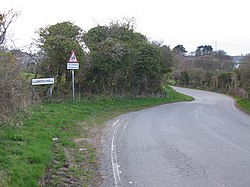Llanfechell
| Llanfechell | |
|---|---|
 |
|
| Llanfechell shown within Anglesey | |
| Population | 1,293 |
| OS grid reference | SH369912 |
| Principal area | |
| Ceremonial county | |
| Country | Wales |
| Sovereign state | United Kingdom |
| Post town | Amlwch |
| Postcode district | LL68 |
| Police | North Wales |
| Fire | North Wales |
| Ambulance | Welsh |
| EU Parliament | Wales |
| UK Parliament | |
| Welsh Assembly | |
Llanfechell (Welsh: Llanfechell llan church + Saint Mechell) is a village in Anglesey, North Wales, UK. It is the largest of several small villages and dispersed settlements that make up Mechell Community Council area. It is 11 miles (18 km) east of Holyhead, and 5.6 miles (9.0 km) west of Amlwch, on the north of the island.
Mechell Community (which also includes Mynydd Mechell and Carreglefn) has a 2001 population of 1,532., decreasing to 1,293 in 2011. Village services include a church, a primary school, a pub and two chapels. It is an agricultural area, and has been a local centre for markets, livestock fairs, and had both a watermill and windmill. The area round about has many prehistoric monuments.
The many prehistoric remains close to the village indicate the area has been lived in for thousands of years. The first written mention of Llanfechell itself is in 1291. However, the name Lanfechell means Church of St Mechell (The 'M' becomes 'F', pronounced v.). Mechell appears to have been a 6th-century missionary, possibly from Brittany, who founded a monastery here. A 17th century manuscript, (Llanstephan MS. 125) records a Welsh poem, "Cywydd i Fechell Sant". This describes how St Mechell was offered a gift of land in gratitude for a miraculous healing, to be demarked by the route of a released hare. The hare, under divine guidance, marked the full extent of what is now the parish of Llanfechell, on which he then founded the monastery.
18th century life in Llanfechell was described in great detail by William Bulkeley (4 November 1691 - October 1760). From 30 March 1734 to September 1760 he kept a daily diary recording Anglesey life, social customs, personal and family dealings, farming practices and the weather. William Bulkeley lived at Brynddu as Squire of Llanfechell. His daughter married Fortunatus Wright, a brewer from Liverpool whose colourful life included periods as a privateer.
...
Wikipedia

